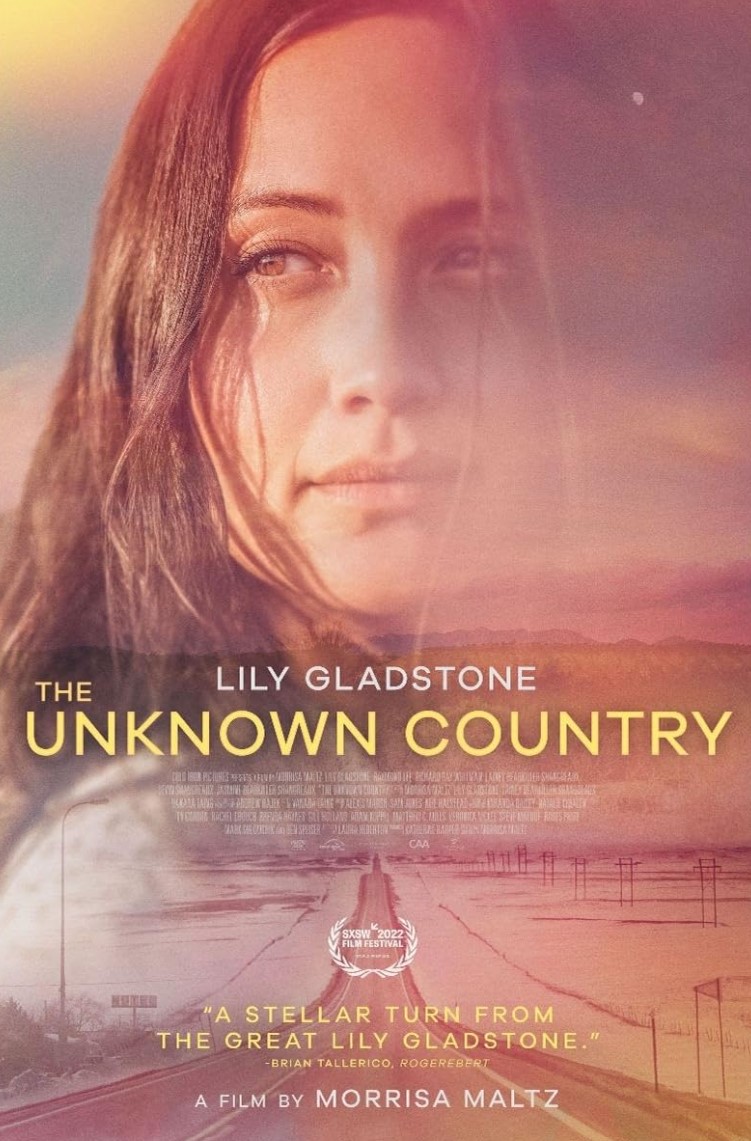Lily Gladstone in The Unknown Country



America’s roadways are lonely, bleak, beautiful, traversed by strangers going hither and yon, lives intersecting for brief moments over counters at diners, motels, convenience stores. Morrisa Maltz, making her feature directorial debut, extracts from her own experiences driving alone across America a story about loneliness, grief, and connection, enhanced by her collaborator and leading lady, Lily Gladstone.
Combining her own story with one inspired by Gladstone and fellow collaborators Lainey Bearkiller Shangreaux and Vanara Taing, Maltz finds remarkable depth and warmth in a solo road trip spanning America’s north-south divide.
Gladstone stars as Tana, recently unmoored by the death of her grandmother, for whom she acted as caretaker. An invitation to her cousin’s wedding spurs Tana to drive from Minneapolis to South Dakota, and the vicinity of the Pine Ridge Reservation, where Tana has her roots in the Oglala Lakota community. Though Minneapolis has a large Native population, Tana hasn’t been to the rez in many years, and Gladstone’s expressive face communicates her disconnection and loneliness as she first arrives in South Dakota, as well as the healing that begins when she reconnects with her family and the land.
There, her cousin Lainey (played by Lainey Bearkiller Shangreaux) is marrying her childhood sweetheart, Devin (played by Devin Shangreaux). It is also on the way to South Dakota that Tana eats at a roadside diner where the waitress, Pam Richter, playing herself, tells her story—her love of people, the joy she finds in her diner and her rescue cats. Maltz’s use of professional and non-professional actors recalls the work of Chloe Zhao and Sean Baker, though Maltz displays a documentarian’s knack for letting people tell their own story in their own words, rather than imposing narrative upon them. The film is peppered with the stories of the real people who work along the lonely stretches of America’s highways, finding purpose and connection in fleeting interactions.
Contrasted to these heartwarming roadside tales are snippets of talk radio, which grow more venal and more divisive as Tana heads south. Overlapping and increasingly angry radio hosts and callers crescendo as Tana arrives in the neon-lighted urban sprawl of Dallas, Texas, seemingly the heart of so much anger and hate. But it is in Texas where Tana meets a group of welcoming strangers, including the charming Isaac (Raymond Lee), who invite her to share a carefree day roaming the city. And it is in Texas that she meets Flo (Florence R. Perrin), a nonagenarian who loves to dance, and the woman who bought a dance hall just so Flo has somewhere to do her dancing.
Maltz never presses the point, she simply lets real people talk in their own words, cutting between them and Gladstone’s warm, heartfelt performance as Tana. As she progresses through her trip, reconnecting with her Lakota family in South Dakota, lightly flirting with Isaac, and tracing her grandmother’s footsteps south, Tana’s stoicism melts and reveals her joy and the peace that eluded her during her grandmother’s final years. Gladstone is an incredibly effective performer, with little need of dialogue to communicate her feelings to the audience. Here, she lets her face do most of the talking, and Maltz keeps her camera squarely focused there, too.
Tana’s journey isn’t without fraught moments—she is an Indigenous woman traveling alone, alert to all possible danger—but overwhelmingly it is a journey that brings Tana back into connection with herself, and the people and landscapes that shaped her. We’re not meant to exist in isolation, and sometimes the best way to remind ourselves of that is to get out and explore the unknown country that binds us together, from back roads to small towns to big cities, and the people who occupy the spaces that are designed to be temporary yet can leave an indelible impression on our memories and senses. Tana’s journey is one of reconnection and discovery, a reminder of all we share as much as a celebration of the unique people we encounter along the way.
The Unknown Country is an intimate film in the cinema verité style about life along the unseen passages that crisscross America. The contrast of angry voices on the radio and the kindnesses shown between travelers and those who come into contact with them, however briefly, is stark, whether it’s a cheerful gas station attendant telling a joke, or a motel housekeeper who takes the time to fold towels into swans. What matters are our connections, to our families, to the land, to each other, and attempts to divide us from those things are destined to fail, as it is human nature to seek connection, even for just a moment.
This review was published during the WGA and SAG-AFTRA strikes of 2023. The work being reviewed would not exist without the labor of writers and actors. The Unknown Country is now playing in select theaters and available on demand.

